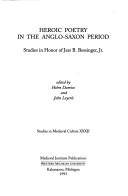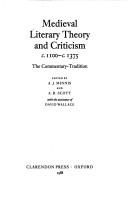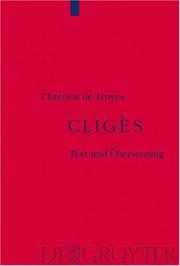| Listing 1 - 10 of 27 | << page >> |
Sort by
|
Book
ISBN: 1442656271 1442632992 1442651393 Year: 1982 Publisher: University of Toronto Press
Abstract | Keywords | Export | Availability | Bookmark
 Loading...
Loading...Choose an application
- Reference Manager
- EndNote
- RefWorks (Direct export to RefWorks)
This study of the definition of literature in the late medieval period is based on manuals of writing and on literary commentary and glosses. It defines a method of reading which may now profitably explain medieval texts, and identifies new primary medieval evidence which may ground and guide new reading. Allen chooses texts whose commentary tradition provides the greatest opportunity for completeness. The most important of these is Ovid's Metamorphoses. Medieval readings of Ovid bring into focus a number of major literary questions--the problems of fable and fiction, of unity imposed by miscellany poetry, of allegorical commentary, and of Christian use of pagan culture--all in connection with text which furnished medieval authors with more stories than any other single source except possibly the Bible. Allen also studies commentaries on the Consolation of Philosophy of Boethius, the Thebaid of Statius, the De nuptiis of Martianus Capella, the medieval Christian hymn-book, and the Poetria nova of Geoffrey of Vinsauf. Together these texts represent the range of medieval literature--a literature which, Allen concludes, was taken as direct ethical discourse, logically conducted and artfully organized within a system of language that also assimilated the natural world and sought to absorb its audience.
Criticism, Medieval --- Poetics --- Literature, Medieval --- History. --- History --- History and criticism. --- Medieval criticism
Book
ISBN: 8884500249 Year: 2002 Volume: 32 4 Publisher: Firenze Sismel Edizioni del Galluzzo
Abstract | Keywords | Export | Availability | Bookmark
 Loading...
Loading...Choose an application
- Reference Manager
- EndNote
- RefWorks (Direct export to RefWorks)
Bible
---
22.06 <09>
---
Bijbel: exegese--
Book
ISBN: 9780812247596 0812247590 Year: 2015 Volume: 2 Publisher: Philadelphia: The Schoenberg Institute for Manuscript Studies. University of Pennsylvania Libraries,
Abstract | Keywords | Export | Availability | Bookmark
 Loading...
Loading...Choose an application
- Reference Manager
- EndNote
- RefWorks (Direct export to RefWorks)
Manuscripts, Medieval --- Literature, Medieval --- Classification --- Civilization, Medieval --- Criticism, Textual --- Philosophy --- Manuscripts, Medieval - Congresses --- Literature, Medieval - Criticism, Textual - Congresses --- Classification - Philosophy - Congresses --- Civilization, Medieval - Congresses

ISBN: 1879288273 Year: 1993 Publisher: Kalamazoo Western Michigan University
Abstract | Keywords | Export | Availability | Bookmark
 Loading...
Loading...Choose an application
- Reference Manager
- EndNote
- RefWorks (Direct export to RefWorks)
Book
ISBN: 3700131828 9783700131823 Year: 2003 Volume: 704 18. Publisher: Wien: Verlag der Österreichischen Akademie der Wissenschaften,
Abstract | Keywords | Export | Availability | Bookmark
 Loading...
Loading...Choose an application
- Reference Manager
- EndNote
- RefWorks (Direct export to RefWorks)
Written communication --- Symbolism --- Manuscripts, Medieval --- Communication écrite --- Symbolisme --- Manuscrits médiévaux --- History --- Congresses --- Congresses. --- Histoire --- Congrès --- Criticism, Textual --- Communication écrite --- Manuscrits médiévaux --- Congrès --- Written communication - Congresses. --- Symbolism - History - Congresses. --- Manuscripts, Medieval - Criticism, Textual - Congresses. --- Book history
Book
ISBN: 8774927698 9788774927693 Year: 1990 Publisher: [Odense]: Odense University press,
Abstract | Keywords | Export | Availability | Bookmark
 Loading...
Loading...Choose an application
- Reference Manager
- EndNote
- RefWorks (Direct export to RefWorks)
Literature, Medieval --- Criticism, Textual --- 091 <063> --- 82.083 --- Handschriftenkunde. Handschriftencatalogi--Congressen --- Teksteditie. Editiewetenschap --- Conferences - Meetings --- 82.083 Teksteditie. Editiewetenschap --- 091 <063> Handschriftenkunde. Handschriftencatalogi--Congressen --- Literature, Medieval - Criticism, Textual - Congresses
Book
Abstract | Keywords | Export | Availability | Bookmark
 Loading...
Loading...Choose an application
- Reference Manager
- EndNote
- RefWorks (Direct export to RefWorks)
Literature, Medieval - Criticism, Textual - Congresses. --- Latin literature, Medieval and modern - England - Criticism, Textual - Congresses. --- Anglo-Norman literature - Criticism, Textual - Congresses. --- Manuscripts, Medieval - England - Editing - Congresses. --- Manuscripts, English (Middle) - Editing - Congresses. --- Paleography, English - Congresses.

ISBN: 0198111983 9780198111986 Year: 1988 Publisher: Oxford: Clarendon,
Abstract | Keywords | Export | Availability | Bookmark
 Loading...
Loading...Choose an application
- Reference Manager
- EndNote
- RefWorks (Direct export to RefWorks)
Literature --- anno 1200-1499 --- Criticism, Medieval. --- Literature, Medieval --- Classical literature --- History and criticism --- Theory, etc. --- -Criticism, Medieval --- -European literature --- Medieval literature --- Medieval criticism --- Literature, Classical --- Literature, Ancient --- Greek literature --- Latin literature --- -Theory, etc --- -History and criticism --- -Medieval criticism --- European literature --- Criticism, Medieval --- History and criticism&delete& --- Theory, etc --- Bible --- Criticism, interpretation, etc. --- History --- Sources. --- Biblia --- Literature, Medieval - History and criticism - Theory, etc. --- Classical literature - History and criticism - Theory, etc.
Book
ISBN: 0691072884 Year: 1985 Publisher: Princeton, N.J. Princeton University Press
Abstract | Keywords | Export | Availability | Bookmark
 Loading...
Loading...Choose an application
- Reference Manager
- EndNote
- RefWorks (Direct export to RefWorks)
History of philosophy --- Criticism --- Criticism, Medieval --- Philosophy, Medieval --- Theology --- -Christian theology --- Theology, Christian --- Christianity --- Religion --- Medieval philosophy --- Scholasticism --- Medieval criticism --- Appraisal of books --- Books --- Evaluation of literature --- Literary criticism --- Literature --- Rhetoric --- Aesthetics --- Style, Literary --- Early works to 1800 --- Appraisal --- Technique --- Evaluation --- Criticism, Medieval. --- Philosophy, Medieval. --- Early works to 1800. --- -Early works to 1800

ISBN: 1282195301 9786612195303 3119162086 3110201542 3110188546 9783110188547 9783110201543 Year: 2006 Publisher: Berlin ; New York : W. de Gruyter,
Abstract | Keywords | Export | Availability | Bookmark
 Loading...
Loading...Choose an application
- Reference Manager
- EndNote
- RefWorks (Direct export to RefWorks)
Cligès was probably written after Erec et Enide and is thus Chrétien de Troyes' second romance. There are several modern English and French translations of the text, but a need has long been felt for a modern German version, particularly as references in Middle High German texts and text fragments indicate that there was at least one Middle High German version. This gap is now filled with the present modern German translation which is published together with the original text in a bilingual edition; this means that the special position which Cligès takes up in more than one respect in the history of the medieval European romance can now form a stronger focus in German Studies. Thus a broader basis is formed both for interdisciplinary medieval studies and for research into the history and theory of the romance. A comprehensive introduction sketches the most important problems in interpreting the work, the present state of research into Cligès in international Romance Studies and its place in the history of the Arthurian romance. With the translation, the introduction, the commentary, and a comprehensive bibliography, this monograph provides an indispensable foundation for future research. It is anticipated that it will meet with wide interest and significantly alter the view taken by German Studies of the history of the romance in medieval Europe. Der Cligès ist vermutlich nach Erec et Enide entstanden und somit der zweite Roman von Chrétien de Troyes. Es existieren mehrere moderne Übersetzungen des Romans in englischer und französischer Sprache, aber eine neuhochdeutsche Übersetzung ist seit langem ein Desiderat. Dies gilt umso mehr, als Erwähnungen in mittelhochdeutschen Dichtungen und fragmentarische Zeugnisse darauf hindeuten, dass es (mindestens) eine mittelhochdeutsche Bearbeitung gegeben hat. Mit der nun vorliegenden ersten neuhochdeutschen Übersetzung, die mit dem altfranzösischen Text zusammen in einer zweisprachigen Ausgabe erscheint, wird diese Lücke geschlossen, so dass die Sonderstellung, die der Cligès in mehr als einer Hinsicht in der Geschichte des Romans im europäischen Mittelalter einnimmt, auch von germanistischer Seite stärker in den Blick genommen werden kann. Damit wird die Basis sowohl für eine interdisziplinär arbeitende Mediävistik als auch für Forschungen zur Geschichte und Theorie des Romans erweitert. In einer umfassenden Einführung werden zudem die wichtigsten Interpretationsprobleme, der aktuelle Forschungstand zum Cligès in der internationalen Romanistik und seine Stellung in der Geschichte des Artusromans skizziert. Mit der Übersetzung, der Einleitung, dem Kommentar und einer umfassenden Bibliographie bietet die Monographie eine unverzichtbare Grundlage für weitere Forschungen. Es ist zu erwarten, dass sie auf breites Interesse stoßen und das germanistische Bild über die Geschichte des Romans im europäischen Mittelalter nachhaltig verändern wird.
Arthurian romances. --- Chrétien, de Troyes, 12th cent. Cligès -- Criticism and interpretation. --- Criticism, Medieval. --- Romances -- Translations into German. --- Criticism --- Evaluation of literature --- Literary criticism --- Literature --- Medieval criticism --- Technique --- Evaluation --- Rhetoric --- Aesthetics --- Arthurian tales. --- Chrétien de Troyes. --- Middle ages/literature. --- Old French.
| Listing 1 - 10 of 27 | << page >> |
Sort by
|

 Search
Search Feedback
Feedback About UniCat
About UniCat  Help
Help News
News